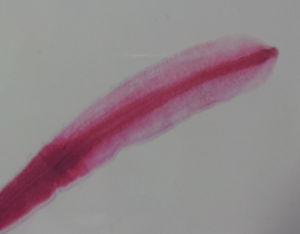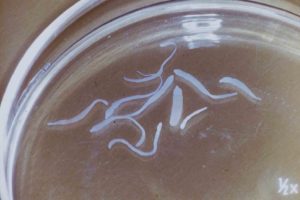The Japanese broad tapeworm, Diphyllobothrium nihonkaiense, is usually only found in fish from Asia’s Pacific coasts, but a recent study published online in the CDC’s Emerging Infectious Diseases journal found that wild salmon netted in Alaska were also contaminated with the parasite.
For the study, researchers cut open 64 wild Alaskan salmon to find the larvae (some up to 15 mm long), and gene sequencing identified it as Diphyllobothrium nihonkaiense. Four species are known to carry the Japanese tapeworm: chum salmon, masu salmon, pink salmon, and sockeye salmon.
The intent of the study, according to the researchers, was “to alert parasitologists and medical doctors about the potential danger of human infection with this long tapeworm resulting from consumption of infected salmon imported (on ice) from the Pacific coast of North America and elsewhere.”
Infection with the tapeworm appears to be relatively uncommon: Only about 2,000 cases have been reported in humans — most of which occurred in northeastern Asia, according to Roman Kuchta, a researcher at the Institute of Parasitology and lead author of the study.
While the risk of developing an infection with the Japanese tapeworm is low, it does exist. Most infected humans have few if any recognizable symptoms — some may feel slight nausea or abdominal discomfort — though in rare cases the infection can turn serious. CDC notes that freezing or cooking the salmon will kill the parasite.
Diphyllobothrium nihonkaiense
Source: Chicago Tribune
 Editor’s note: For more information on food poisoning outbreak lawsuits and your legal rights, please contact the nationally recognized food poisoning lawyers at Ron Simon & Associates. Ron Simon’s groundbreaking work on behalf of victims in recent national foodborne illness outbreaks has been featured on NBC, ABC, CBS, CNN, FOX and virtually all other major television networks and print media.
Editor’s note: For more information on food poisoning outbreak lawsuits and your legal rights, please contact the nationally recognized food poisoning lawyers at Ron Simon & Associates. Ron Simon’s groundbreaking work on behalf of victims in recent national foodborne illness outbreaks has been featured on NBC, ABC, CBS, CNN, FOX and virtually all other major television networks and print media.Click Here for a Free Confidential Case Consultation


